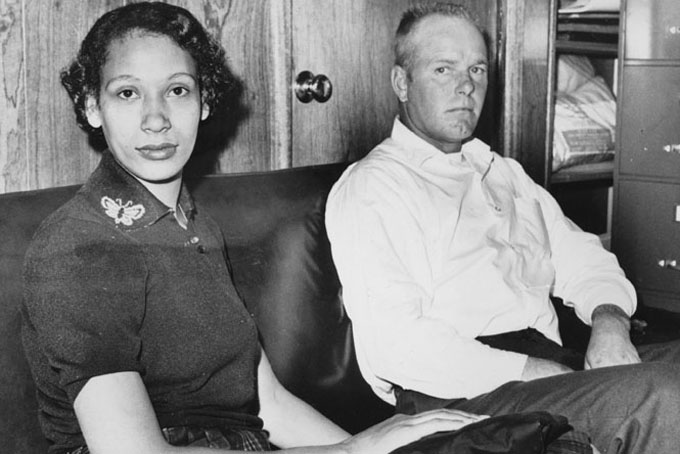
FRANKFORT, Ky. (AP) _ In 1967, Liane Peters, an immigrant from Germany, fell in love with a quiet, handsome man she worked with at a Miami bakery. The couple went together to the Dade County courthouse and asked for a marriage license. But she was White and he was Black, and a county judge turned them away.
Two months earlier, the United States Supreme Court had struck down laws across the country forbidding interracial marriages, and the waves of resistance that rippled across the South took years to dissipate.
Legal experts suggest that history might hint at how the coming months will unfold, as a handful of defiant clerks across the South and Midwest refuse to abide by the Supreme Court’s ruling last month that legalized gay marriage.
The first test was set to begin Monday in a Kentucky courtroom. The American Civil Liberties Union filed a lawsuit against Rowan County Clerk Kim Davis, who cited her Christian faith on June 30 as she refused to issue marriage licenses to any couple, gay or straight. Other county clerks rallied around her, demanding the government protect Christians from having to issue marriage licenses to same-sex couples.
The aftermath of the Supreme Court’s 1967 ruling Loving v. Virginia played out in similar ways, according to Sam Marcosson, a constitutional law professor at the University of Louisville. Now, once again, scattered patches of resistance will force the courts to intervene.
“What we learn from this is that it shouldn’t be surprising, that it’s going to take some time, that change does not get fully accepted overnight,” he said. “But it does ultimately. In the end, people’s rights are going to be realized.”

In 1967, Liane Peters and James Van Hook, turned to the NAACP, which sued the county and won. The couple received a license the following year.
They are still married, 47 years later. Van Hook is 82 and his wife is 76. They have two sons and three grandkids, she said. They still live in a little house with a big yard and garden they bought soon after their wedding.
Interracial couples across the South also had to sue, said Peter Wallenstein, a history professor at Virginia Tech who wrote a book called “Tell the Court I Love my Wife” about race and marriage in the United States. The legal battles dragged on for years.
In 1970, three years after the Supreme Court’s decision, an Alabama judge denied a marriage license to a White soldier stationed at Fort McClellan and his African-American fiancee, Wallenstein wrote. The federal government sued to force the county to comply.
“The result is a foregone conclusion. I’m not too concerned about where we’re heading and that we’re going to get there. The question is how long they can stall and make mischief,” said Kenneth D. Upton, senior counsel for Lambda Legal, a law office that specializes in LGBT issues.
Some take offense at the comparison between interracial marriages five decades ago and the religious objections to same-sex marriage that clerks are raising today.
“This is so much different than that,” said Mat Staver, founder of the conservative law firm Liberty Counsel. “People who think it might die down underestimate that this is a matter that cannot simply be put away by people of faith forced to participate in something they believe is wrong.”
He compares clerks to conscientious objectors who refused to comply with the U.S. Supreme Court’s 1857 decision in Dred Scott v. Sandford, which held that African-Americans were not citizens and could not sue in federal courts. The judges who declined to enforce that ruling ended up on the right of history, he said.
Staver’s Florida-based firm is representing the Rowan County clerk and others like her across the country. He said they have consulted with more than two dozen government officials who object to issuing licenses to same-sex couples.
He intends to ask the court at Monday’s hearing to allow for those with religious objections to be exempt from having to issue licenses. They took office and swore an oath when marriage was defined as being between a man and a woman, he said.
Others scoff at the thought of letting elected officials decline to do part of their job. Marcosson compared the situation to the Catholic Church’s refusal to marry people who have been through a divorce. The church and its followers have the religious freedom to decline to recognize those marriages. But a Catholic clerk in public office has no right to deny a civil marriage license to someone who has been divorced, he said.
Still, Casey County Clerk Casey Davis marched into the state capitol Thursday and asked Gov. Steve Beshear to find a way to accommodate his religious reservations. About 50 people, other clerks and elected officials among them, gathered in the rotunda to pray.
Beshear told Davis to issue licenses or resign.
At Monday’s hearing, a judge could order Davis to issue marriage licenses. If she declines, the judge could hold her in contempt of court and fine, or jail her. But she cannot be removed from office because she is an elected official.
The lingering question for Wallenstein, the historian and writer, is whether history will treat the gay marriage ruling as kindly as it has the Loving decision. Today, five decades later, interracial marriages are roundly accepted and universally enforced. But the complex collision of religious conviction and gay rights might prove more impervious to change.
Liane Van Hook, after all, who fought so hard for interracial marriage, is herself opposed to same-sex unions.
___
AP News Researcher Jennifer Farrar contributed to this story from New York. Associated Press reporter Adam Beam contributed reporting.